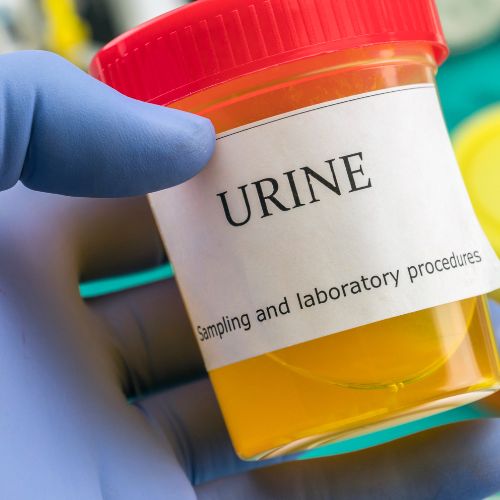Blood Clots in Urine: Causes & When it is an Emergency.
Our content is not intended nor recommended as a substitute for medical advice by your doctor. Use for informational purposes only.
The presence of blood clots in urine means significant bleeding inside the urinary tract. When the bleeding is significant, blood forms a clot that appears in the urine.
Blood clots in urine are considered an emergency when:
- Darkening hematuria with clots that don’t improve after a few urinations.
- Blood clots that don’t easily pass during urination.
- Development of urine retention (clots obstructing the urine stream).
- Worsening pain (renal colic or bladder pain).
- Fever.
- Pallor, shortening of breath, fast heartbeats, or fainting attacks.
Main causes of blood clots in urine.
1. Urinary tract Stones.
Urinary tract stones are one of the commonest causes of heavy blood in the stool (leading to blood clots in urine).
Kidney stones may cause injury when they move inside the urinary tract leading to hematuria with clots.
Symptoms of stones in the urinary system:
- Kidney stones cause loin pain (in the flanks and upper back on both sides).
- Bladder stones often cause central pelvic pain (urinary bladder pain).
- Ureteric stones cause severe flank pain that radiates to the groin and the inner thigh.
- Some cases are completely asymptomatic and may present with isolated blood in the urine.
- The pain is often sudden onset, severe, and colicky and may last minutes to hours.
- Turbid urine.
- The pain may be associated with nausea and/or vomiting.
- Heavy bleeding with blood clots in urine may also occur if the stone cause injury to any part of the urinary tract.
- Obstruction of the urine outflow can also occur in severe cases.
Urinary stones are often diagnosed by an imaging study such as an X-ray, ultrasound, or CT scan of the urinary tract.
Learn more about urinary stones.
2. Urinary bladder cancer.
Cancer of the urinary bladder is one of the common malignancies. It represents about 4.5% of all diagnosed cancers in the united states (reference).
The cancer mass inside the bladder often bleeds and may present with blood clots in urine.
Risk factors of bladder cancer (reference).
- Cigarette smoking.
- Being older (more than 50).
- Being male.
- Opium use.
- Occupation exposure to carcinogens as with metal workers, painters, rubber industry workers, leather workers, textile and electrical workers, miners, cement workers, transport operators, excavating-machine operators, and jobs that involve the manufacture of carpets, paints, plastics, and industrial chemicals.
- Genetics also plays a role.
- Schistosomiasis infection (common in north Africa and Japan).
Symptoms & diagnosis:
- Early bladder cancer may present with irritative symptoms such as painful urination (dysuria), the urgency to urinate, or frequent urination.
- Bladder cancer typically causes painless urine bleeding (intermittent attack).
- Blood is often present throughout the urination.
- Bladder pain or pressure in the lower abdomen.
- Dysuria or pain after the end of urination.
- Signs of metastasis may also exist, such as bone pain, abdominal pain, liver pain, headache, or blurring of vision.
- Weight loss, anorexia, and other systemic symptoms may also present.
Other types of urinary tract cancer that may cause blood clots in urine are:
- Kidney cancer.
- Prostate cancer (in men only).
- Ureteric cancer.
- Urethral cancer.
3. Trauma.
Trauma to the kidney, ureters, urinary bladder, or urethra may cause blood clots in the urine. Urinary tract trauma often results from:
- Recent urinary catheter insertion.
- Recent cystoscopy ( a cystoscope is a small device that allows your doctor to see the inside of the urinary bladder. It is introduced through the urethra).
- Major pelvic trauma (as with road traffic accidents).
- Kidney trauma (blunt trauma to the flanks).
Most cases of urinary tract trauma are mild and result in minor & self-limiting hematuria. But major
Report any history of recent trauma to the urethra, pelvis, or flanks to your doctor.
4. Urinary tract infection (UTI).
Urinary tract infection is the most common urinary tract disease (especially among women). Typically, females with UTI have lower urinary tract symptoms such as burning urination (dysuria), frequency, and urgency.
However, bloody urine can result from severe UTI cases (including blood clots or strings in urine).
Symptoms & diagnosis:
UTI may present with blood in urine with normal CT scan results. As doctors, we suspect UTIs based on characteristic symptoms. Urine analysis or urine culture usually confirms the UTI.
- Dysuria: burning or pain in the urethra when you pee.
- Urgency: sudden severe urgency to pee.
- Frequency: Frequent urge to pee but only a small amount of urine comes out.
- Suprapubic (lower abdominal) pain.
- Turbid (cloudy) urine may also be present.
- Blood in urine
- The symptoms may be very mild, with a strange feeling in the bladder and urethra.
- Also, UTI may become complicated (reaching the kidneys), causing high fever, flank pain, chills, etc.
- The diagnosis is often established by urine analysis and culture. CT scans are often normal with UTIs, even with blood in the urine.
What to do:
UTI is a very common cause of abnormal urinary symptoms in females. Consult your doctor to confirm the diagnosis if you have symptoms consistent with UTI.
UTIs are treated mainly by antibiotics (such as Nitrofurantoin and Trimethoprim-sulfamethoxazole).
The blood in urine often resolves with antibiotic treatment. However, if it doesn’t go away after UTI treatment, you should tell your doctor, as it may be due to other causes.
An over-the-counter urinary analgesic such as Oral phenazopyridine may help relieve the dysuria and uncomfortable urethral sensations.
5. Others.
Other possible causes of blood clots in urine include (reference):
- Benign kidney tumors.
- Adult polycystic kidney disease.
- Pyelonephritis (complicated UTI).
- Hydronephrosis.
- Arteriovenous malformations.
- Sickle cell disease (papillary necrosis of the kidney).
- Ureteric stricture.
- Ureteric polyp.
- Recent surgery or instrumentation of the urinary tract.
- Urinary bladder radiation.
- BPH (Benign prostatic hypertrophy) or prostate operations.
- Urethral diverticulum.
- Urinary tract endometriosis.
- Tuberculosis of the urinary tract.
- False hematuria (blood clots from menses, spotting, or other causes of vaginal bleeding).
- Drugs such as phenytoin.
Are blood clots in urine an emergency?
The presence of small clots or blood streaks with yellow or slightly pink urine is not often an emergency but should be investigated by your doctor as soon as possible.
Blood clots are considered an emergency if they are associated with persistent dense red urination (Dense hematuria) or low blood pressure symptoms (fainting, dizziness, or fast heartbeats).
Also, blood clots may obstruct the ureter or urethra (especially in males) and prevent urine outflow. Acute urine retention due to clots obstructing the urethra is considered an emergency (reference).
When blood clots are considered an emergency (reference):
- Blood clots with darkening hematuria that doesn’t improve after a few urinations.
- Blood clots that don’t easily pass during urination.
- Development of urine retention (clots obstructing the urine stream).
- Worsening pain (renal colic or bladder pain).
- Fever.
- Pallor, shortening of breath, fast heartbeats, or fainting attacks.
The good news about blood clots in urine.
Having blood clots in urine always means a non-glomerular cause of the blood. The glomerulus is the most important part of the urinary system as it represents the functional unit of the kidney.
The glomeruli present in the kidney cortex (outer part of the kidney) and inflammation of the glomeruli (glomerulonephritis) may cause blood in urine but NOT blood clots in urine.
Glomerulonephritis is a serious disease that may cause kidney failure. The presence of blood clots in urine is an exclusion of this significant kidney disease.
- Evidence-based
- Written by a doctor.
MD, Internal Medicine and Nephrology specialist.

Dr. Esraa A. MagidAuthor
MORE INSIGHTS





